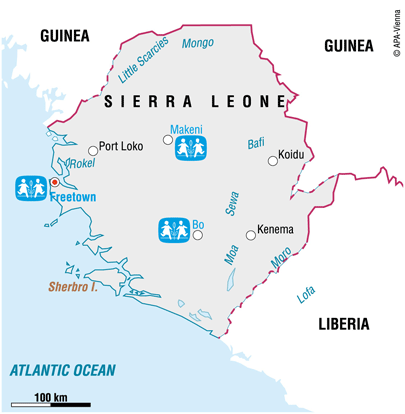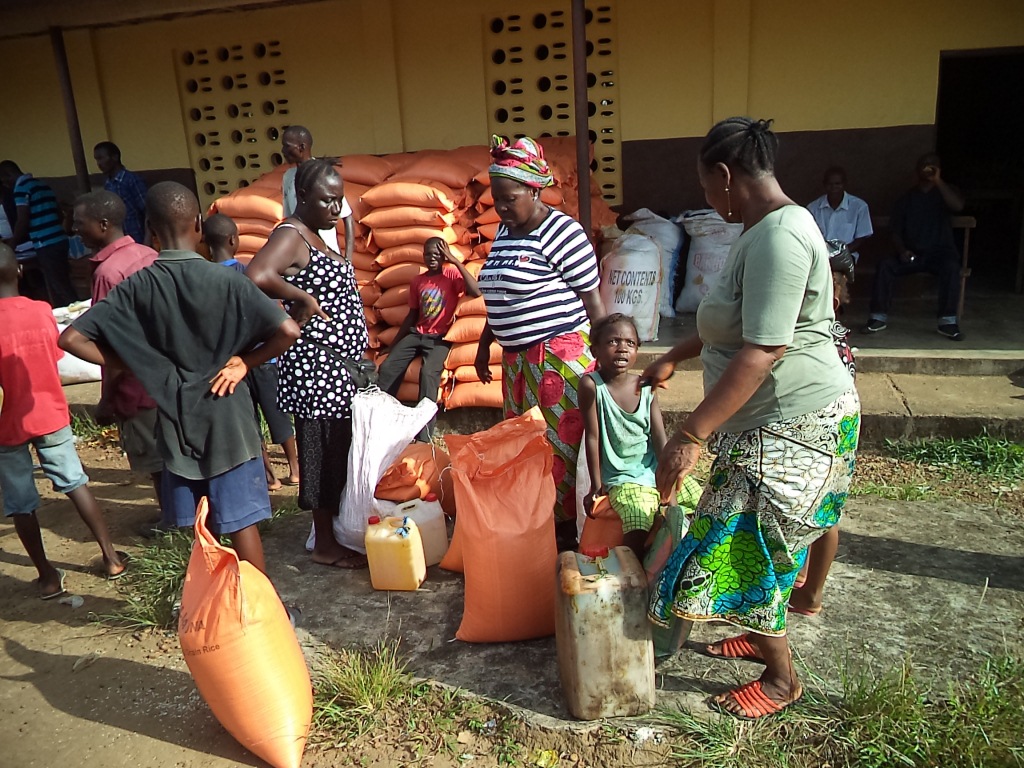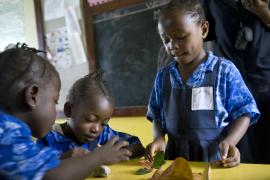
Vi er i Sierra Leone
Shattered by war
The Republic of Sierra Leone is a country located in Western Africa. Since gaining independence from former colonial power Great Britiain in 1961, the country`s history has been rather turbulant. A cruel civil war that lasted from 1991 until early 2002 cost thousands of lives and resulted in the displacement of more than two million people – about one third of the country`s population. Although Sierra Leone is one of the poorest countries in Africa, its soil is home to ample resources. The country is extremely rish in diamonds, gold, cocoa, coffee and bauxite.
One of the richest countries in Africa remains one of the poorest
Despite significant natural wealth, Sierra Leone remains one of the poorest countries in the world: around 80 per cent of its population live in crippling poverty. Semi-arid rural areas tend to be more affected than the urban centres of the country. Economic recovery has been going fairly slowly and a major part of the country's GDP is coming from international donors.
The average Sierra Leonean can expect to live to 48 years, one of the lowest life expectancy figures in the entire world.
Nearly half the population is severely undernourished as regular access to food and drinking water remains scarce.
HIV/AIDS remains a persisting public health issue in Sierra Leone, a country that is home to 49,000 people who suffer from the disease. Although noticeable progress has been made over recent years, HIV continues to be a significant problem in rural areas which are generally more affected than urban centres.
Children are in need of protection
.jpg?width=800)
The psychological effects on children that were exposed to the atrocities that occurred during the country's civil war go deep. According to estimates, 310,000 children in Sierra Leone grow up without their parents, many of them as a result of the war. 18,000 of them have been orphaned due to AIDS. The Ebola epidemic, which started in 2014, left many more children without parental care.
Orphaned children often face the challenge of being the breadwinner for an entire family at a very early age. Thousands of Sierra Leonean children work in the country's mines in order to make a living. They have to carry out physically challenging tasks like digging in soil and gravel or shifting heavy masses of mud.
At 119 per 1,000 live births, Sierra Leone also has one of the highest infant mortality rates in the world. Access to food remains a challenge for the majority of Sierra Leonean families. One in four children is either moderately or severely underweight.
A shortage of schools and teachers heavily affects the education of Sierra Leonean children. During the war, thousands of schools were partially or completely destroyed. In spite of recent efforts to make education more accessible, more than half of the school-aged population don’t go to school. The country continues to have one of the highest illiteracy rates in the world: only 42 per cent of Sierra Leoneans aged 15 and over know how to read and write. In mid- 2014 the situation worsened, as schools were shut in order to prevent the spread of the Ebola virus.
Child-trafficking has become just another growing problem in Sierra Leone. Poor families, predominantly coming from rural areas, are often lured to give away their children under promises that later turn out to be false. In some cases, these children end up as domestic slaves or they are forced into commercial sexual exploitation.
SOS Children's Villages in Sierra Leone
SOS Children's Villages has been supporting vulnerable children, young people and families in Sierra Leone since 1974.
Care in SOS families: For those children who cannot live with their families, SOS Children's Villages provides direct care in SOS families. Children grow up with their siblings and are cared for by an SOS parent. Some families live in homes in the local community.
Whenever possible, we work closely with the children’s family of origin, so that they can return to live with their families. We support them during the period of change and adjustment.
Education: In order to make sure the children have access to quality education, we run kindergartens and schools in Sierra Leone. Around 3000 students benefit from our work here.
Support for young people: We support young people until they are able to live independently. We support them while they continue their further education and also provide them with training.
Emergency Programme: During the civil war, we ensured that the children in our care stayed safe and provided emergency relief to those escaping the violence. Likewise, during the Ebola epidemic of 2014, we worked with other agencies to provide advice, food, protective equipment and disinfectants to the local communities. The focus of these activities was on the children who had lost parental care, or were at risk of losing it.
